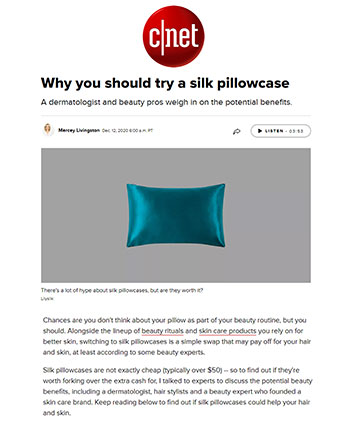cnet December 12, 2020
 cnet
cnet
Health and Wellness
Why you should try a silk pillowcase
A dermatologist and beauty pros weigh in on the potential benefits.
Chances are you don't think about your pillow as part of your beauty routine, but you should. Alongside the lineup of beauty rituals and skin care products you rely on for better skin, switching to silk pillowcases is a simple swap that may pay off for your hair and skin, at least according to some beauty experts.
Silk pillowcases are not exactly cheap (typically over $50) -- so to find out if they're worth forking over the extra cash for, I talked to experts to discuss the potential beauty benefits, including a dermatologist, hair stylists and a beauty expert who founded a skin care brand. Keep reading below to find out if silk pillowcases could help your hair and skin.
What makes it a silk pillowcase?
Most pillowcases are made from cotton or microfiber, and come included in a set of sheets. You can also buy silk or satin pillowcases, both of which have a smoother texture than cotton and microfiber and are meant to help give you better hair or skin.
Silk pillowcases are made from, well, silk, a natural protein fiber from silk worms that's soft and breathable, meaning it allows air to pass through. Silk is more expensive than cotton and other kinds of fibers, which is why silk pillowcases are likewise more expensive than others.
Satin pillowcases are cheaper than silk because satin can be made from a variety of different fibers woven in a certain way to give the "shiny" satin feel and effect, according to manufacturer Lily Silk. Satin is typically made from polyester and has a similar smooth texture to silk, but is generally less breathable.
Benefits of silk pillowcases for hair
Most of us wake up with crazy hair in the morning, which can be a bummer if you spent a lot of time styling your hair the night before. That's because as you move around in your sleep, your hair rubs against your pillowcase, causing friction that can lead to tangles and even breakage. Silk pillowcases can help preserve your style and keep your hair smoother than a traditional cotton pillowcase, according to hairstylists, because they put less friction on your hair.
If you get annoyed with morning tangles and bedhead, a silk pillowcase might help you wake up with smoother strands.
"Silk pillowcases reduce friction and are not as absorbent of moisture, therefore they can reduce frizziness and help you maintain moisture [in your hair] throughout the night," says Joseph Maine, celebrity hair stylist and co-founder of Trademark Beauty.
All different hair types that can benefit from silk pillowcases, but people with fine, curly or blonde hair may find it especially helpful, according to Shelly Aguirre, stylist at Maxine Salon in Chicago. "Blonde hair tends to be more fragile, so the silk will help prevent more damage. Also, curly hair tends to get frizzy with the friction of cotton, so the silk will help the hair 'glide' instead," Aguirre says.
If you have oily hair, a silk pillowcase may not be the best choice, since a cotton pillowcase will absorb oil better, according to Aguirre. Silk pillowcases will be more beneficial if you have dry hair, or are experiencing breakage.
Silk pillowcase benefits for skin
According to Heather Marianna, beauty expert and founder of Beauty Kitchen, silk pillowcases can help people with acne, since the silk pillowcase causes less friction on your face at night than cotton. "Because of how gentle a fabric it is, it provides relief even for the most sensitive of skin," Marianna says.
When you shop for silk pillowcases, you'll notice a lot of marketing claims that the pillowcases can help your skin look better and prevent wrinkles, but according to dermatologist Caren Campbell, the science behind the claims is not solid. While silk pillowcases haven't been proven to reduce wrinkles, copper-infused pillowcases might, according to a small isolated study.
Campbell encourages patients to focus on overall sleep quality and skin care routines instead of pillowcases to get the results they want. "It's more important to do good sleep hygiene and get good sleep, as not getting enough sleep shortens telomeres, which are a marker for aging on your chromosomes," Campbell says.
When it comes to acne, "the better option is doing a good science backed skin care routine for acne that includes a retinoid and benzoyl peroxide," Campbell says. For concern around aging skin or wrinkles she recommends "an anti-aging routine that includes a mineral sunscreen, retinoid and antioxidant as well as lifestyle choices that prevent aging, like sun avoidance, not smoking, exercise and a healthy diet," she says.
